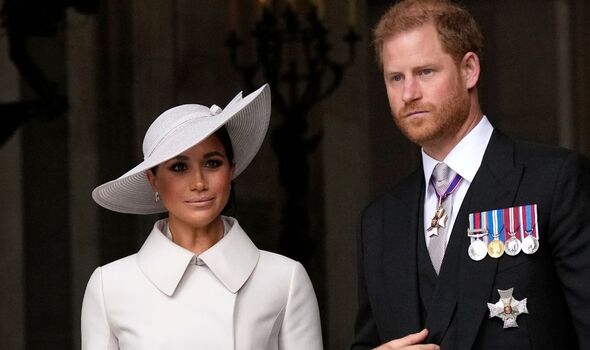Must Read
### Meghan Markle Sets the Stage for Prince Harry’s Family Reunion: Two Conditions for Reconciliation
The relationship between Prince Harry and the British Royal Family has been under intense scrutiny, especially with Harry's desire to mend fences.
However, Meghan Markle has laid down two firm conditions that she insists must be met for any potential reconciliation to take place.
This development not only adds tension to an already fraught situation but could also have significant implications for the future of the monarchy.
Before diving into Meghan's demands, it's essential to understand the backdrop of this royal drama.
The rift between Prince Harry and his brother, Prince William, began long before their departure from royal duties in 2020—an event now commonly referred to as “Megxit.”
Various factors contributed to their growing estrangement, including differing perspectives on royal responsibilities and the relentless pressure from the media.
However, the situation escalated dramatically after Harry and Meghan's bombshell interview with Oprah Winfrey in March 2021, where they made startling allegations about racism within the royal household and a lack of support during their time as senior royals.
During that interview, Meghan shared her feelings of isolation and even suicidal thoughts, shocking audiences worldwide and sending ripples through the monarchy.
While Prince William publicly denied the allegations of racism, the brothers have since maintained minimal contact, highlighting the deep-seated issues that remain unresolved.
Now, Meghan has clearly articulated what needs to happen for a family reunion to occur.
Her first demand is straightforward yet profound: she seeks a formal apology from Prince William and Kate Middleton.
Meghan feels that their treatment of her has negatively impacted her mental health, straining her relationship with them.
Reports of tension between Meghan and Kate date back to before her wedding in 2018, including an incident where Meghan claimed Kate made her cry, although the narrative has shifted over time.
Meghan's second condition focuses on the future, as she desires a commitment from the royal family to treat her with kindness and respect moving forward.
She fears that without this assurance, any attempts at reconciliation would ultimately fail.
The toxic environment surrounding royal life, exacerbated by media scrutiny, has taken a toll on her well-being, and she is adamant that her mental health must be prioritized.
Prince Harry's role in this ongoing saga has also become a topic of debate.
Some critics argue that he is merely following Meghan's lead, while Harry maintains that his choices are independent and reflect shared concerns.
He genuinely wishes to reconcile with his family but emphasizes the need for accountability and recognition of past grievances as a prerequisite for healing.
The involvement of Prince William and Kate is pivotal in this reconciliation process.
As the future king and queen, their stance significantly influences the dynamics within the royal family.
Both have remained largely silent regarding the allegations, focusing instead on their royal duties and maintaining a dignified public image.
However, the hurt stemming from Meghan and Harry's accusations looms large, making it difficult for them to consider a public apology without risking the monarchy's reputation.
The future of the royal family hangs in the balance as they navigate this complex situation.
With King Charles III now at the helm, changes in family dynamics are inevitable.
If Meghan's conditions are met, it could herald a new era for the monarchy—one that embraces modernity and inclusivity.
Conversely, failure to resolve the feud may allow the tension to persist, casting a shadow over the royal family and affecting younger generations like Prince George and Princess Charlotte.
As the world watches, the question remains: can true reconciliation occur?
Meghan's demands for an apology and respectful treatment set a high bar, but the royal family's tradition of privacy complicates matters.
Harry is caught in a delicate balancing act, trying to forge a new path with Meghan while still valuing his family ties.
This ongoing drama isn't just about personal grievances; it reflects a pivotal moment for the British monarchy itself.
The institution has faced numerous challenges recently, from scandals involving Prince Andrew to the legacy of colonialism.
Harry and Meghan's departure and subsequent revelations have only intensified scrutiny on the royal family.
Moreover, Meghan's experiences have sparked critical discussions about the monarchy's ability to evolve alongside contemporary values.
Her arrival brought hopes of a more diverse and progressive royal family, but the resistance she faced suggests that change may be slow in coming.
Her conditions for reconciliation could be seen as a broader challenge to the monarchy's willingness to adapt.
Public sentiment plays a crucial role in shaping this narrative.
The British royal family has always relied on its relationship with the public, but opinions are now more polarized than ever.
Some view Harry and Meghan's actions as a betrayal, believing they should have remained committed to their royal duties.
Critics argue that Meghan's demands for an apology are excessive and that the couple should seek to mend their relationships privately.
As this royal saga unfolds, one thing is clear: the stakes are high, and the future of the British monarchy hangs in the balance.
Will they rise to the occasion and embrace the change necessary for reconciliation, or will the rift continue to define their legacy?
The world is watching, and the answers may very well shape the monarchy for years to come.






























